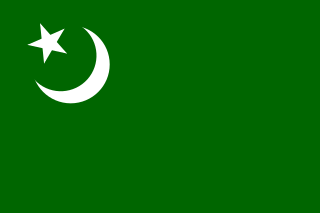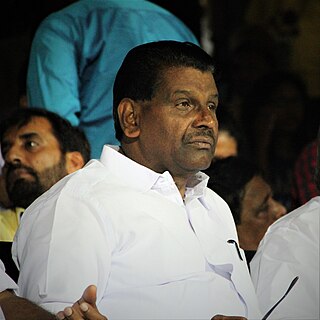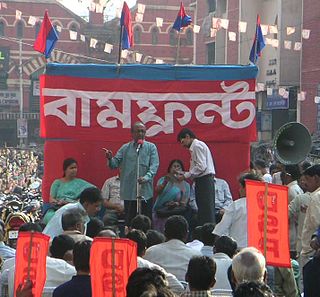
The Communist Party of India (Marxist) is the largest communist party in India. The party emerged from a split from the Communist Party of India in 1964. The CPI(M) was formed at the Seventh Congress of the Communist Party of India held in Calcutta from 31 October to 7 November 1964. As of 2018, CPI(M) is leading the state government in Kerala and having elected members in 8 state legislative assemblies including Kerala, West Bengal, Tripura, Himachal Pradesh, Maharashtra, Odisha, Jammu & Kashmir, and Rajasthan. It also leads the West Bengal Left Front. As of 2016, CPI(M) claimed to have 1,048,678 members. The highest body of the party is the Politburo.

The Communist Party of India (CPI) is the oldest communist party in India. There are different views on exactly when it was founded. The date maintained as the foundation day by the CPI is 26 December 1925. The Communist Party of India (Marxist), which separated from the CPI in 1964 following an ideological rift between China and the Soviet Union, continues to claim having been founded in 1925.

Left Democratic Front (LDF) is a coalition of left-wing political parties in the state of Kerala, India. It is one of the two major political coalitions in Kerala, the other being the United Democratic Front each of which have been in power alternatively for the last two decades. LDF won the May 2016 election, and is now in power. The coalition consists of Communist Party of India (CPI), Communist Party of India (Marxist) and variety of other smaller parties.

The Indian Union Muslim League (IUML) is a political party in India. It is recognized by the Election Commission of India as a State Party in Kerala.

Chelat Achutha Menon was the Chief Minister of Kerala state for two terms. The first term was from 1 November 1969 to 1 August 1970 and the second 4 October 1970 to 25 March 1977. He was instrumental in starting number of institutions and development projects in Kerala. Achutha Menon was the only politician who adorned the chief minister ship of Kerala for two consecutive terms. He led the then United Front to a thumping electoral victory in Kerala when Congress party was routed in elections in other parts of India.

Thiruvanchoor Radhakrishnan is an Indian politician. From 13 April 2012 to 1 January 2014 he was the Home Minister in Oommen Chandy Ministry, Government of Kerala. He held the Vigilance Portfolio, handed over from then Chief Minister Oommen Chandy. He handed over the charges of Home Ministry to Ramesh Chennithala from 1 January 2014, and took the Forest, Transport, Sports, Cinema & Environment portfolios.

The eleventh legislative assembly election of Tamil Nadu was held on 2 May 1996. The Dravida Munnetra Kazhagam (DMK) led front won the election and its leader M. Karunanidhi, became the chief minister.This was his fourth term in office. S.Balakrishnan, also known as So.Balakrishnan, of Tamil Maanila Congress (TMC) became the Leader of the Opposition. The incumbent Anna Dravida Munnetra Kazhagam (ADMK) government was defeated in a landslide with its leader and outgoing chief minister J. Jayalalitha losing the election from the Bargur constituency.

The first legislative assembly Election to the Madras state on the basis of universal adult suffrage was held in March 1952. This was the first election held in Madras state after the Indian Independence. This election was officially known as 1951 Madras State Election, even though through delays, actual voting didn't take place until early 1952.
M. N. Govindan Nair, popularly known as MN, was born in Pandalam, in Pathanamthitta District, India.
P.K. Raghavan is the former Minister of Kerala State. He came to active politics through the Student movement of the Communist Party.
Paloli Mohammed Kutty is an Indian politician, social worker, the former Minister for Local Administration in the Government of Kerala and a member of both State and Central Committee of Communist Party of India (Marxist). He represented the Ponnani constituency in Malappuram district in the Kerala Legislative Assembly from 2006-2011.
E. Chandrasekharan Nair was an Indian politician, Minister of Kerala and leader of the Communist Party of India.

Aryadan Muhammed is a veteran Indian National Congress party leader and the former Minister for Electricity and Transport in the Oommen Chandy Ministry. He represented the Nilambur constituency in Kerala after winning in the 2011 State Election.

G. Karthikeyan was an Indian politician and the speaker of the Kerala Legislative Assembly. He was the Member of the Legislative Assembly (M.L.A) from Aruvikkara, Thiruvananthapuram, who represented the Indian National Congress party.
N. Sakthan is an Indian politician who was Speaker of the Kerala Legislative Assembly from 2015 to 2016. He was also the Member of the Legislative Assembly (MLA) from Kattakada, Thiruvananthapuram, from 2011 to 2016.
The Kerala Legislative Assembly election of 1965 was the third assembly election in the Indian state of Kerala.

The Left Front is an alliance of political parties in the Indian state of West Bengal. It was formed in January 1977, the founding parties being the Communist Party of India (Marxist), All India Forward Bloc, the Revolutionary Socialist Party, the Marxist Forward Bloc, the Revolutionary Communist Party of India and the Biplabi Bangla Congress. Other parties joined in later years, most notably the Communist Party of India.

T. V. Thomas was an Indian communist leader from Alleppey, Kerala. He was the Minister for Labour and Transport in the First E. M. S. Namboodiripad ministry, Minister for Industries in the Second E. M. S. Namboodiripad Ministry and in the Second Achutha Menon Ministry. He was also the Opposition Leader in the Travancore-Cochin Legislative Assembly (1954-56).
United Front or Aikya Munnani was a coalition of political parties in Kerala state, India, which was the ruling combine in the state from 1970 to 1979. The front was formed by five political parties, viz. Communist Party of India (CPI), Indian National Congress (INC), Revolutionary Socialist Party (RSP), Indian Union Muslim League (IUML) and Praja Socialist Party (PSP), immediately before the 1970 Kerala Legislative Assembly election. The alliance saw the inclusion a few other parties in the following years. United Front dissolved in 1979 after the constituent parties left the alliance in order to form new political alliances, viz. the Left Democratic Front and the United Democratic Front.














